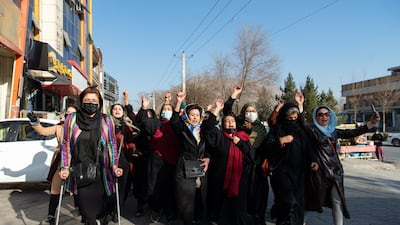More than 20 top British universities have pledged to offer Afghan women free courses for as long as the Taliban ban females from attending universities in Afghanistan.
Afghanistan's ruling Taliban announced last month that women would no longer be able to study at universities and higher education establishments. Institutions were told to implement the ban as soon as possible.
Now, a number of British universities have teamed up through FutureLearn to offer the women in Afghanistan free access to digital learning platforms.
Girls and women with internet access will be able to study more than 1,200 courses from top institutions at no cost to themselves.
FutureLearn, which was set up by the Open University in 2012, delivers courses on behalf of about a quarter of the world’s top 200 universities.
Twenty-six of the top 30 UK universities are FutureLearn partners, including 21 of the 24 Russell Group institutions.
They include Trinity College, Dublin, University of Nottingham, York University, University of Leeds, London's Goldsmiths and UCL.
Through FutureLearn all the universities offer various online courses.
Jo Johnson, chairman of FutureLearn, said the move would provide a “lifeline” for those wanting to learn.
“For girls and women who can access the internet and afford the time, this could be a lifeline,” he said.
“While this is of course no silver bullet — poor connectivity, poverty and language barriers mean many women may not be able to access the material — it can nonetheless play a valuable part in enabling women in Afghanistan to assert their inalienable human right to education.”
Lord Mark Malloch-Brown, president of the Open Society Foundation, welcomed the initiative to give women access to education, free of charge.
“The Taliban think the world has forgotten them; we mustn’t,” he said.
“This commendable move by FutureLearn to open up its platform to women denied their rights under this regime will play a useful part in keeping education within reach of those with an internet connection.
“It is a welcome sign that our commitment to fighting for human rights for all Afghans remains strong.”
The move to ban females from higher education is one of the latest measures by the Taliban to increase restrictions on women's rights since their takeover of Afghanistan, after the US-led international withdrawal in 2021.
It has sparked international condemnation, as well as protests in the country.
The UAE and Saudi Arabia have led calls for the decision to be reversed.
Foreign Ministers from Australia, Canada, France, Germany, Italy, Japan, the Netherlands, Norway, Spain, Switzerland, the UK, the US and the High Representative of the EU have also strongly condemned the move.
“A stable, economically viable, and peaceful Afghanistan is only attainable and sustainable if all Afghans, including women and girls, can fully, equally, and meaningfully participate in and contribute to the country’s future and development,” they said in a joint statement.
There are fears that up to 35 of Afghanistan's 140 private universities could face closure as a result of the move — which will affect up to 70,000 female students.
One of the Taliban's higher education ministers, Nida Mohammad Nadim, has defended the ban, saying it is necessary to prevent the mixing of genders in universities. He claimed some subjects are a breach of Islamic and Afghan values.









